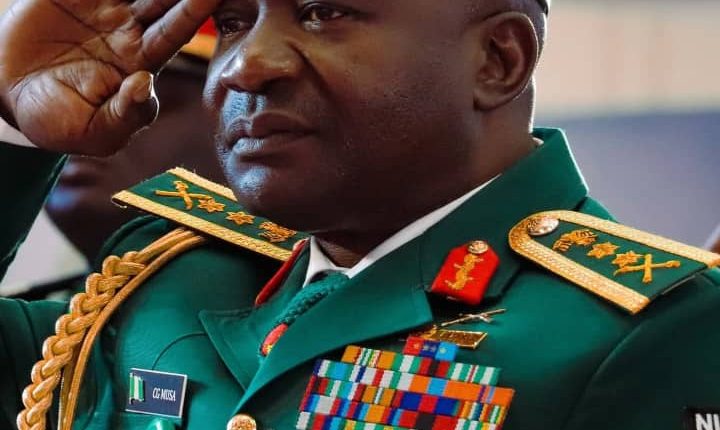Gen. Christopher Musa: The Brevity of a brave warrior
|
Getting your Trinity Audio player ready...
|
By Usman Abdullahi Koli
When the news broke that General Christopher Gwabin Musa had been relieved of his duties as Chief of Defence Staff, many Nigerians were caught between silence and disbelief. There was no scandal, no controversy, no public reason. It was simply the quiet exit of a man who carried the burden of the uniform with rare discipline and decency.
General Musa was not the loud, camera-chasing type. He believed that a soldier’s worth rests in results, not in talk. He led with calm authority and the moral strength of a man who understood that leadership is service, not privilege. His mission was not to impress but to protect, and those who worked with him often described him as a commander who fought with both brain and heart.
As Confucius said, “He who has conquered himself is the mightiest warrior.” General Musa lived that truth daily. His greatest victories were not only on the battlefield but in the discipline he carried within himself. He conquered ego, comfort, and fear. Those qualities made him not just a soldier but a statesman in uniform.
I have often written about leaders, sometimes critically, sometimes in admiration, depending on where the truth is pointed. But General Musa stands in that rare place where even a critic must pause and appreciate. He was one of those few who reminded us that true leadership rests not in power but in principle, not in position but in purpose.
Under his leadership, the Armed Forces coordinated better and spoke with one voice. The push against terrorism and banditry regained energy, particularly in the Northwest. The fall of Halilu Sububu and the renewed confidence in Zamfara, Katsina, and Kaduna were not accidents. They were evidence of deliberate strategy and consistent field intelligence. He also strengthened cooperation among the services and improved civil-military relations, emphasizing discipline, professionalism, and respect for human rights.
He once said in a BBC Hausa interview that negotiating with bandits was “counterproductive,” warning that those who promote it “will regret it.” On Al Jazeera, he asked questions the government preferred to avoid: “Who is funding them? Who is training them? Who is supplying their weapons?” Those were not soundbites but moral challenges from a man who had seen too much blood to play politics with peace.
Some say his courage cost him his seat. If true, that would be another proof of how this country often mistakes honesty for insubordination. Yet that courage remains his greatest decoration. The government may have replaced him with another general, but they cannot replace him with another Christopher Musa.
He has now stepped aside, but his style of leadership, quiet, firm, and humane, will linger long after the medals fade. Nigeria’s security challenges are not only about weapons but about will. As Scripture says, “Blessed are the peacemakers, for they shall be called the children of God.” And in every sense, General Christopher Gwabin Musa lived as one, a peacemaker who fought with his heart and served with his soul.
Koli can be reached at
[email protected]



Comments are closed, but trackbacks and pingbacks are open.